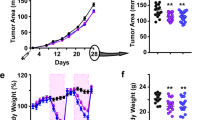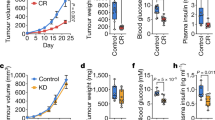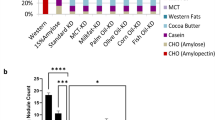Abstract
Seventy-five nude mice received subcutaneous inoculation with 1 X 10(7) cells of the human colonic cancer cell lines COLO-320 or HT-29. Tumour growth was assessed over 4 weeks in animals given one of three iso-caloric diets; standard diet, high saturated fat (20% coconut) diet and high n-3 fat (20% Maxepa fish oil) diet. The n-3 diet produced significant tumour growth reduction compared to the other diets for COLO-320 at 3 to 4 weeks (P less than 0.05 at least) and similarly for HT-29 at 4 weeks (P less than 0.05). Significant incorporation of n-3 fatty acids occurred in red cell membranes, adipose tissue and both neutral lipid and phospholipid fractions of tumour lipids in animals fed Maxepa (P less than 0.01 at least). This was accompanied by reduction of linoleic acid and arachidonic acid in these tissues (P less than 0.01 at least) but was most marked in the metabolically labile phospholipid fraction. There was high mitotic activity in the tumours from all the groups but there was no difference according to diet.
This is a preview of subscription content, access via your institution
Access options
Subscribe to this journal
Receive 24 print issues and online access
$259.00 per year
only $10.79 per issue
Buy this article
- Purchase on Springer Link
- Instant access to full article PDF
Prices may be subject to local taxes which are calculated during checkout
Similar content being viewed by others
Author information
Authors and Affiliations
Rights and permissions
About this article
Cite this article
Sakaguchi, M., Rowley, S., Kane, N. et al. Reduced tumour growth of the human colonic cancer cell lines COLO-320 and HT-29 in vivo by dietary n-3 lipids. Br J Cancer 62, 742–747 (1990). https://doi.org/10.1038/bjc.1990.370
Issue Date:
DOI: https://doi.org/10.1038/bjc.1990.370



